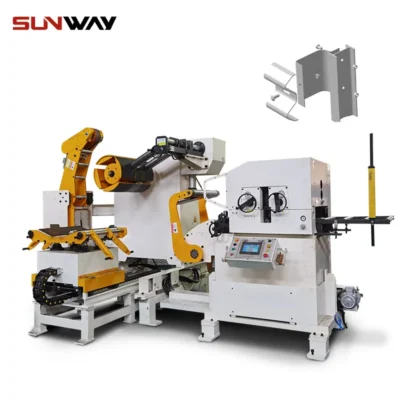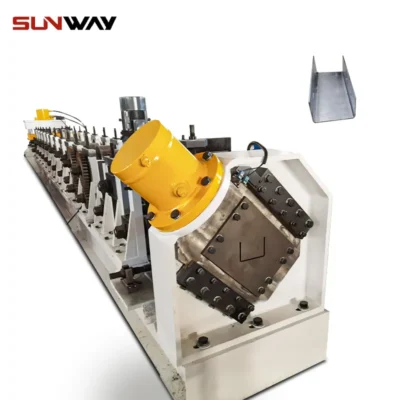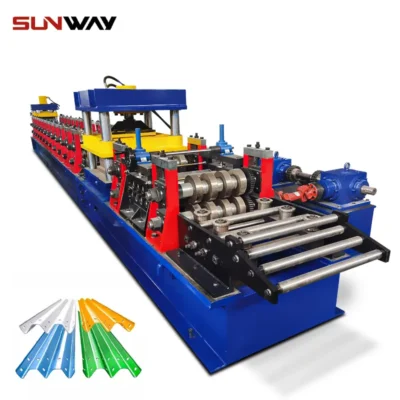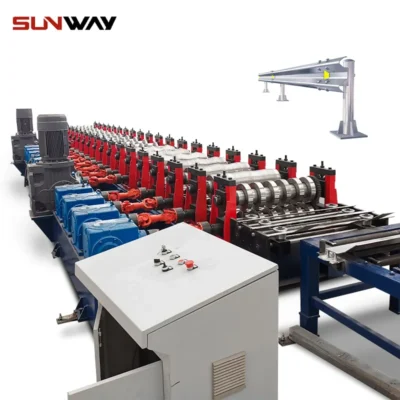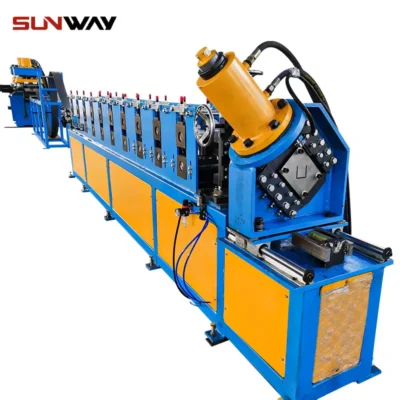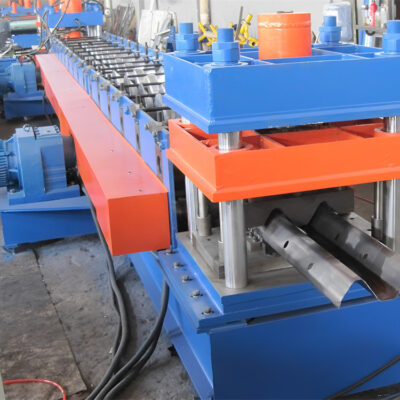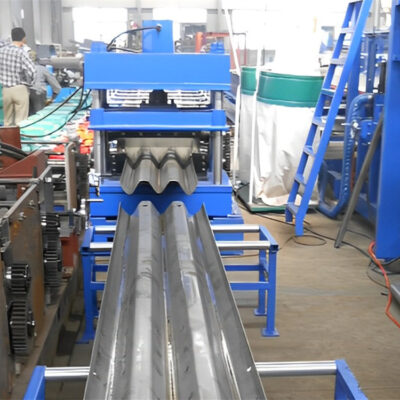Imagine a bustling construction site. Cranes reach for the sky, welders spark, and workers navigate a maze of scaffolding. These temporary platforms, vital for reaching high points and creating safe workspaces, rely on a crucial component: the scaffolding plank. But where do these ubiquitous planks come from? Enter the scaffolding plank making machine, the unsung hero that churns out the foundation for safe and efficient construction.
Function of Scaffolding Plank Making Machine
At its core, a scaffolding plank making machine is a specialized metal forming machine. It takes a long sheet of steel coil and transforms it into the sturdy planks used in scaffolding structures. Here’s a breakdown of the process:
- अनकॉइलिंग: The machine unwinds the steel coil, feeding it into the production line.
- Leveling: Any unevenness in the sheet is corrected to ensure a consistent starting point.
- Servo Feeding: Precisely controlled feeding mechanisms guide the steel through the forming process.
- 冲孔: Holes or slots are punched into the sheet as needed for plank design and functionality.
- 辊压成型: A series of rollers progressively bend and shape the steel into the final profile of the plank. This profile creates a ribbed or corrugated surface, enhancing strength and slip resistance.
- 切断: Once formed, the machine cuts the steel to the desired plank length. This can be programmed for various standard sizes or customized as needed.
- Stacking: The finished planks are automatically stacked or conveyed for further processing or packaging.
The entire process is automated and efficient, allowing for high-volume production of consistent, high-quality scaffolding planks.
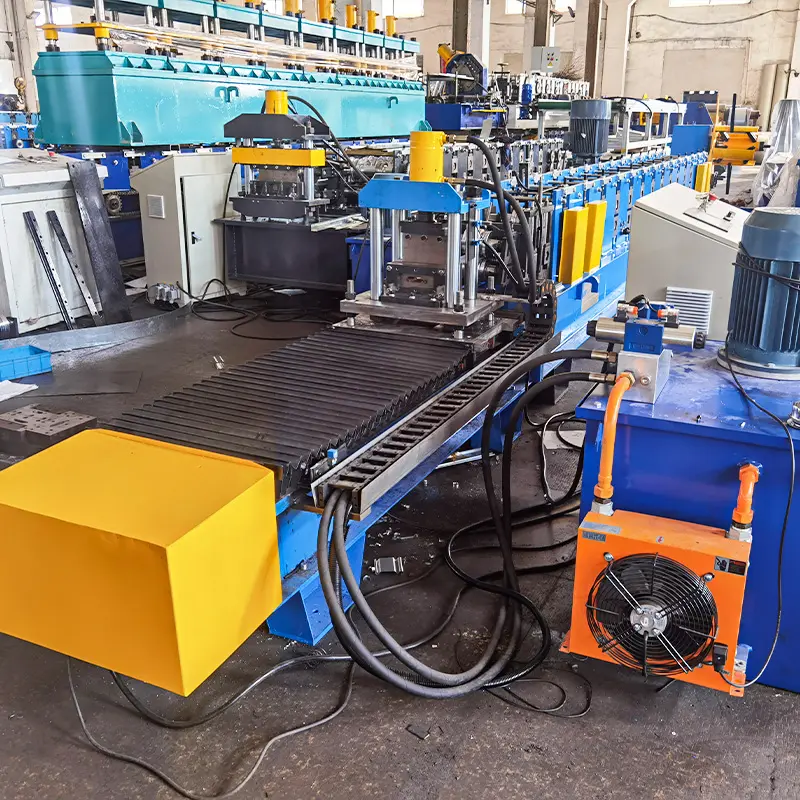
Types of Scaffolding Plank Making Machines
The world of scaffolding plank making machines isn’t a one-size-fits-all affair. Here’s a breakdown of the two main types:
- Roll Forming Machines: These are the most common type, offering versatility and efficient production. They can create a variety of plank profiles, thicknesses, and lengths by adjusting the forming rolls and cutting settings.
- Press Brake Machines: Less common but offering higher forming force, press brake machines are used for thicker planks or those with complex profiles. They utilize a series of bending tools to shape the steel sheet.
Additional Considerations:
- Automation Level: Machines range from semi-automatic, requiring operator intervention for loading and unloading, to fully automatic with minimal human interaction.
- Production Speed: Output varies depending on machine size and complexity. High-speed machines can churn out hundreds of planks per hour.
- 定制选项: Certain manufacturers offer machines that can be configured to create planks with specific features, like hooks or integrated end pieces.
Function Comparison: Roll Forming vs. Press Brake
| विशेषता | रोल बनाने की मशीन | Press Brake Machine |
|---|---|---|
| Versatility | High – wide range of profiles possible | Lower – suited for specific, complex profiles |
| उत्पादन गति | Generally faster | Slower forming cycle |
| Complexity | Less complex setup and operation | More complex tooling and setup |
| 成本 | Generally lower | Higher due to more robust construction and tooling needs |
| Material Thickness | Suitable for a wide range of thicknesses | Better suited for thicker materials |
The choice between a roll forming and press brake machine depends on your specific production needs. Roll forming machines excel in high-volume, versatile production, while press brakes offer the power to handle thicker materials or specialized designs.
Applications of Scaffolding Plank Making Machines
The primary application of scaffolding plank making machines is, of course, the production of planks for scaffolding structures. These planks provide safe and stable walking surfaces for construction workers at various heights. However, their application extends beyond construction:
- Event Staging: Scaffolding planks are commonly used as platforms for temporary stages in concerts, festivals, and other events.
- Shipbuilding and Maintenance: These planks offer sturdy walkways in shipyards and for ship maintenance.
- Industrial Access Platforms: In factories and industrial settings, scaffolding planks create temporary access platforms for maintenance and repairs.
The versatility and strength of scaffolding planks make them a valuable tool in various industries.
Advantages of Scaffolding Plank Making Machines
Investing in a scaffolding plank making machine offers several advantages:
- 提升效率: Compared to manual plank fabrication, these machines significantly boost production speed and output.
- 一致品质: Automated production ensures consistent plank dimensions and strength, meeting safety standards.
- Reduced Labor Costs: With minimal manual intervention, these machines reduce labor requirements, impacting bottom-line costs.
- सामग्री बचत: Automated machines minimize material waste compared to manual cutting and fabrication.
- Increased Control: Manufacturers gain greater control over plank production schedules and quality standards.
- कम लीड टाइम: In-house production allows for faster response to project demands and reduces reliance on external suppliers.
- Customization Potential: Some machines offer the ability to create planks with specific features, catering to niche market needs.
Beyond Efficiency: Safety and Sustainability
The benefits of scaffolding plank making machines extend beyond pure production efficiency. Automated production helps to:
- Enhance Safety: Consistent quality control minimizes the risk of defective planks entering the market, promoting workplace safety on construction sites.
- Promote Sustainability: By reducing material waste and optimizing steel usage, these machines contribute to a more sustainable manufacturing process.
These advantages highlight the crucial role scaffolding plank making machines play in ensuring safe and efficient construction practices while minimizing environmental impact.
Disadvantages of Scaffolding Plank Making Machines
While offering significant advantages, there are also some considerations when evaluating scaffolding plank making machines:
- High Initial Investment: The cost of acquiring and installing a machine can be substantial, requiring careful planning and return on investment calculations.
- Maintenance Requirements: Like any complex machinery, regular maintenance is crucial to ensure optimal performance and avoid costly downtime.
- Space Requirements: Setting up a scaffolding plank making machine requires dedicated production space to accommodate the equipment and material handling.
- Skillset for Operation: While some machines are user-friendly, operating them effectively might require training for staff on aspects like machine setup, maintenance, and quality control.
Weighing the Pros and Cons:
The decision to invest in a scaffolding plank making machine depends on your specific needs and business model. If you anticipate high-volume production and require consistent quality control, the advantages can outweigh the initial investment. However, for smaller operations or those with limited space or budget, partnering with a reliable scaffolding plank supplier might be a more suitable option.
Scaffolding Plank Making Machine Suppliers
The market offers a variety of scaffolding plank making machine suppliers, each with its strengths and areas of expertise. Here are some key factors to consider when choosing a supplier:
- Machine Reputation: Research the manufacturer’s reputation for quality, reliability, and customer service.
- Machine Capabilities: Ensure the machine meets your production needs in terms of speed, capacity, and plank profile options.
- After-Sales Support: Reliable after-sales support, including spare parts availability and technical assistance, is crucial for smooth operations.
- Price and Payment Options: Compare pricing structures and explore financing options to fit your budget.
Supplier Pricing (Indicative):
It’s important to note that pricing for scaffolding plank making machines can vary significantly depending on factors like:
- Machine size and capabilities
- Brand reputation and technology
- Level of automation
- Additional features
Here’s a table providing a general range for budgeting purposes (USD):
| Machine Type | Indicative Price Range |
|---|---|
| Basic Roll Forming Machine | $50,000 – $100,000 |
| 高速辊压成型机 | $100,000 – $200,000 |
| Press Brake Machine | $150,000 – $300,000+ |
Remember, these are just starting points. Contacting potential suppliers for specific quotes is essential for accurate pricing.
By carefully evaluating your needs and researching potential suppliers, you can find the right scaffolding plank making machine to optimize your business operations and contribute to a safe and efficient construction industry.
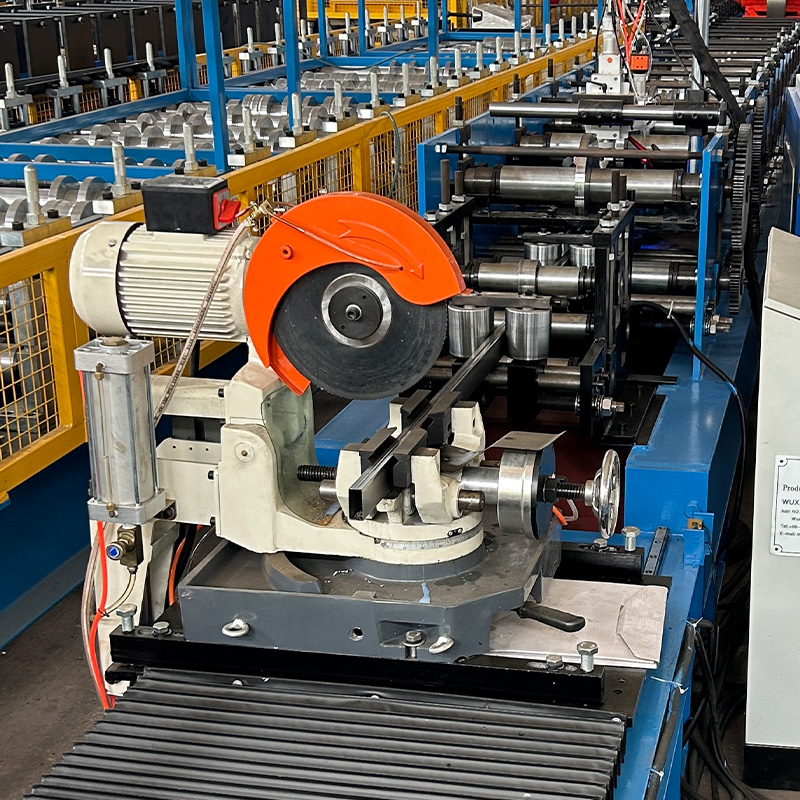
सामान्य प्रश्न
Q: What are the typical safety features of a scaffolding plank making machine?
A: Safety features can vary depending on the machine model, but some common ones include:
- Emergency stop buttons
- Pinch point guards
- Light curtains to prevent operator access during operation
- Proper grounding to prevent electrical hazards
Q: How long do scaffolding plank making machines typically last?
A: With proper maintenance, a well-built scaffolding plank making machine can last for decades. Regular maintenance schedules and prompt replacement of worn parts are crucial for maximizing lifespan.
Q: What are some of the challenges associated with operating a scaffolding plank making machine?
A: Here are some potential challenges:
- Maintaining consistent material quality: Fluctuations in steel coil quality can impact plank consistency.
- Ensuring proper setup and calibration: Regular machine calibration is essential for maintaining accurate plank dimensions.
- Managing scrap metal: Developing a system for handling and recycling scrap metal generated during production is crucial.
Q: Are there any regulations governing scaffolding plank production?
A: Yes, scaffolding planks must comply with specific safety standards to ensure their load-bearing capacity and overall safety. These standards can vary by region, so consult with local authorities for specific requirements.
Frequently Asked Questions (FAQ)
1) What standards should scaffolding planks produced by a Scaffolding Plank Making Machine comply with?
- Common references include EN 12811 (Europe), OSHA 1926 Subpart L and ANSI/ASSP A10.8 (US), AS/NZS 1577 (Australia/NZ), and BS 2482 for timber equivalency checks. Always align machine output QA to the destination market’s standard.
2) What material grades and thicknesses are typical for steel scaffolding planks?
- Galvanized steel per EN 10346 (e.g., DX51D+Z, S250GD–S350GD) at 1.0–2.0 mm thickness is common. For heavy-duty planks or longer spans, 2.0–2.5 mm may be specified. Corrosion-resistant Zn-Al-Mg coatings (ZM120–ZM275) are increasingly used.
3) How fast can a modern roll-forming Scaffolding Plank Making Machine run?
- Typical 15–35 m/min for standard profiles with punching; high-speed lines reach 40–60 m/min with servo flying cutoff and optimized die sets. Throughput depends on hole/pattern density and cut length.
4) Which inline quality controls reduce scrap and rework?
- Optical vision for hole positions, laser gauges for plank width/height, load-cell monitoring at cutoff, and inline thickness/coat weight reports from the coil supplier. Statistical process control (SPC) with Cp/Cpk targets ≥1.33 on critical dimensions is recommended.
5) What are key options to enable quick changeovers between plank profiles?
- Cassette/rafted roll stands, digital recipe libraries (coil, thickness, hole pattern, cut length), servo stand positioning, quick-connect hydraulics/pneumatics, and pre-set shims. These can cut changeover from 2–4 hours to 30–60 minutes.
2025 Industry Trends
- Safety-first design: Wider adoption of anti-slip emboss patterns validated to EN 12811 dynamic load tests.
- Coating shift: Zn-Al-Mg (e.g., Magnelis/ZAM) replacing conventional galvanizing for 2–4× corrosion life in coastal/industrial environments.
- Smart factories: Predictive maintenance on roll stands and cutoffs; vision-based 100% inspection becomes standard on export lines.
- Energy and ESG: Buyers specify kWh/ton targets and EPDs; demand for scrap recycling loops and coil origin transparency grows.
- Modular tooling: OEMs push cassette roll sets for plank length/width variants and hook/end-clip integrations without long retooling.
Market and Technology Snapshot (2023–2025 est.)
| Metric | 2023 | 2024 | 2025 (est.) | Notes/Sources |
|---|---|---|---|---|
| Global scaffolding market value (USD bn) | 51.0 | 54.2 | 58.0 | Industry syntheses: Grand View Research; FMI |
| Share of plank lines with inline vision QA (%) | 22% | 30% | 42% | EuroBLECH/bauma exhibitor disclosures, OEM datasheets |
| Average line speed (m/min) for punched planks | 28 | 31 | 35 | OEM catalogs; user benchmarks |
| Adoption of Zn-Al-Mg coated steel in planks (%) | 12% | 18% | 26% | ArcelorMittal Magnelis, Nippon Steel ZAM technical notes |
| Typical energy intensity (kWh/ton formed) | 120 | 112 | 102 | Vendor case studies; plant audits |
| Lines using predictive maintenance analytics (%) | 25% | 34% | 45% | Deloitte Manufacturing Outlook 2025 |
Authoritative references:
- EN 12811 Temporary works equipment (CEN)
- OSHA 29 CFR 1926 Subpart L; ANSI/ASSP A10.8
- EN 10346 and EN 10169 for coated steels
- ArcelorMittal Magnelis, Nippon Steel ZAM technical datasheets
- Deloitte 2025 Global Manufacturing Outlook
Latest Research Cases
Case Study 1: Closed-Loop Vision Control Reduces Defects (2024)
- Background: A Middle East manufacturer producing galvanized scaffolding planks (1.5–2.0 mm) faced 3.8% rework from hole misalignment and length variation at 30 m/min.
- Solution: Implemented inline vision (camera array) for hole/slot measurement, laser length verification, and automatic servo corrections on the flying cutoff. Added SPC dashboards and recipe-based stand positions.
- Results: Rework fell to 1.4% (−63%), OEE improved by 6.5 points, and Cp/Cpk for hole pitch >1.5. Energy per ton reduced 8% via optimized cutoff timing. Sources: OEM application note; plant QA reports aligned with EN 12811 checks.
Case Study 2: Zn-Al-Mg Conversion for Extended Life Planks (2025)
- Background: EU exporter sought longer corrosion life for rental fleets in coastal regions without increasing gauge.
- Solution: Switched from Z275 to ZM250 coating; upgraded roll tooling PVD coatings to mitigate pickup; revised lube chemistry and added edge-conditioning passes to prevent micro-cracking at emboss.
- Results: Neutral salt spray equivalency predicted 2.2–3.0× life; warranty claim rate projected −40% over three years; total cost per service cycle −7%. Sources: ArcelorMittal Magnelis design guidance; internal lifecycle cost model.
Expert Opinions
- Maria Kovalenko, Product Director, Formtek Group
- “In 2025, cassette tooling plus recipe-driven setups are table stakes. Buyers should specify sub-60-minute changeovers to stay profitable with mixed plank portfolios.”
- Eng. David R. Miller, Safety Consultant, ANSI/ASSP A10 Committee
- “Producers must link machine QA to field performance. Validating dynamic load and slip resistance per EN 12811 while documenting traceability is critical for global exports.”
- Prof. Jianhui Luo, Materials Scientist, Tongji University (advisor to scaffolding OEMs)
- “Zn-Al-Mg coatings enable responsible down-gauging, but only with the right tooling finishes and lubricants. Edge integrity is the limiter—design for it.”
Practical Tools/Resources
- Standards and compliance:
- EN 12811 overview (CEN): https://standards.cencenelec.eu
- OSHA 1926 Subpart L scaffolding: https://www.osha.gov
- EN 10346 coated steel spec: https://standards.cencenelec.eu
- Design and simulation:
- Altair Inspire/Form roll forming simulation: https://altair.com/inspire-form
- QForm/MSC forming analysis: https://www.qform3d.com
- Inline QA and SPC:
- Keyence vision systems: https://www.keyence.com
- Minitab SPC: https://www.minitab.com
- Coating technical data:
- ArcelorMittal Magnelis: https://construction.arcelormittal.com/magnelis
- Nippon Steel ZAM: https://www.nipponsteel.com
- Smart factory/PdM:
- Siemens MindSphere: https://siemens.com/mindsphere
- PTC ThingWorx: https://www.ptc.com/thingworx
Implementation tips for Scaffolding Plank Making Machine buyers:
- Specify servo flying cutoff with encoder sync; length tolerance ±0.5–1.0 mm at 35 m/min.
- Require inline vision for hole pitch/offset and laser width/height gauges with SPC logging.
- Choose cassette/rafted stands and pre-set shim packs for rapid profile changes.
- Request energy metering (kWh/ton) and vibration/temperature sensors on key stands for PdM.
- Validate with a digital run-off: first-article inspection to EN 12811 loads, slip test report, and coated steel certification (EN 10346).
Sourcing checklist:
- Verify local service SLAs and spare parts stock (motors, PLCs, hydraulic units).
- Audit sample planks for emboss quality, edge integrity, and coating damage post-forming.
- Confirm training packages for operators and maintenance, including HMI recipe management.
Last updated: 2025-10-28
Changelog: Added 5 FAQs; included 2025 trend table and market data; provided two 2024/2025 case studies; inserted expert opinions; compiled practical tools/resources; added buyer implementation and sourcing tips
Next review date & triggers: 2026-04-30 or earlier if EN/OSHA scaffolding standards update, major Zn-Al-Mg technical guidance changes, or significant advances in inline vision/SPC/predictive maintenance occur

